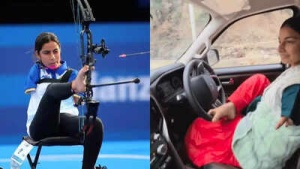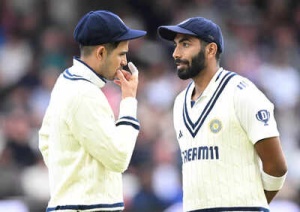Prasidh Krishna, the Indian bowler, is determined to improve his economy rate and bowl better lengths after acknowledging his performance in the recent Test matches was below par.

With just four Tests under his belt, Prasidh Krishna is already focusing on addressing his economy rate, which currently stands at 5.07 after bowling 90 overs. This is an area he is eager to refine.
His economy became a significant concern during the defeat at Headingley, where he conceded 6.28 runs per over, while Shardul Thakur gave away 5.56. As the bowlers brought in to change the momentum, neither could effectively sustain pressure, exacerbating India's challenges once the spells of Jasprit Bumrah and Mohammed Siraj concluded.
"Every time I bowl, I aim to bowl a maiden over and avoid conceding boundaries," Krishna stated. "At Headingley, the outfield was rapid, and my lengths and lines were not consistently accurate. Consequently, the batsmen capitalized. Some boundaries came off edges, and some resulted from attempted bouncers."
Krishna elaborated, "Someone in the team had to take responsibility. If I prioritize my economy over taking wickets, it would be detrimental. If conceding a four or a six leads to the dismissal of a batsman like Jamie Smith, I am willing to do that. However, each time I bowl, I aim to keep the economy rate down and build pressure."
He further added, "I've discussed this game with several teammates. I am committed to reducing my economy to the best of my ability. I believe I am also learning. It's my responsibility to improve, and I am working towards that. I want to ensure I put in the necessary effort and return with better numbers."
The lengths Krishna alluded to are noteworthy. On a ground traditionally favoring bowlers who hit the good length area (6-8 meters), Krishna bowled a surprisingly high number of balls – 104 out of 211 – short of a good length during the Test. Although this length earned him three of his five wickets, it also resulted in a high concession rate of 7.54. Krishna admitted this overcompensation stemmed from his reluctance to bowl fuller deliveries that could be easily driven.
"In the first innings, I bowled shorter than intended, with the ideal length being 6 to 8 meters. In the second innings, I improved slightly because the wicket was slower. I had to pitch a few deliveries slightly shorter and then go fuller when trying to take a wicket," he explained.
Krishna acknowledged, "I didn't bowl the lengths I wanted to. One reason was my reluctance to bowl it up there, and also, it took me time to adjust to the slope. There are no excuses why I shouldn't be able to do it as a professional. I take complete responsibility for it, and I hope to do better next time."
The lessons Krishna speaks of must be quickly implemented, especially with India likely without Jasprit Bumrah for at least two of the remaining four Tests due to workload management. This places greater responsibility on Krishna, both in attack and defense.
"The team culture encourages learning from each other, regardless of who is present. Bumrah has been in constant communication with all of us, even before arriving here," Krishna noted.
"I have been part of this team for several years, so these conversations are ongoing. However, experience is something you gain firsthand. We are all excited. The team has experienced players like Siraj, who will continue to play, and new opportunities will arise for others," he concluded.
Beyond his bowling responsibilities, Krishna will also be expected to contribute more with the bat, particularly after India's batting collapses at Headingley – 7 for 41 in the first innings and 6 for 31 in the second. The Indian lower-order has been diligently practicing in the nets, and Krishna is aware of the need to place a higher value on his wicket.
"As lower-order batsmen, we are definitely working on our batting. We are putting in the effort during our net sessions and focusing on trusting our skills and staying at the crease longer. The runs will come eventually, and that's what we are striving for."
Newer articles
Older articles
 Evil Eye Amulet: Protective Charm or Portal to Dark Forces? A Cultural Debate
Evil Eye Amulet: Protective Charm or Portal to Dark Forces? A Cultural Debate
 Paralympic Archer Sheetal Devi's Viral Video Shows Her Driving Car with Feet, Defying Expectations
Paralympic Archer Sheetal Devi's Viral Video Shows Her Driving Car with Feet, Defying Expectations
 Umpire Controversy Erupts: West Indies Coach Sammy Questions Holdstock's Consistency in Barbados Test
Umpire Controversy Erupts: West Indies Coach Sammy Questions Holdstock's Consistency in Barbados Test
 Black Caps Set for Blockbuster Home Season Against Cricket Heavyweights
Black Caps Set for Blockbuster Home Season Against Cricket Heavyweights
 Batting Collapses and Dropped Catches Cost India Despite Pant's Centuries: Gambhir Defends Lower Order After Test Loss
Batting Collapses and Dropped Catches Cost India Despite Pant's Centuries: Gambhir Defends Lower Order After Test Loss
 Shastri Urges India to Reconsider Bumrah Rest Strategy After Headingley Defeat
Shastri Urges India to Reconsider Bumrah Rest Strategy After Headingley Defeat
 Suryakumar Yadav Sidelines: Indian Cricket Star Undergoes Surgery for Sports Hernia – What It Means
Suryakumar Yadav Sidelines: Indian Cricket Star Undergoes Surgery for Sports Hernia – What It Means
 20 Minutes to a Healthier You: Neurologist Reveals Simple Daily Habits to Combat High Cholesterol, Blood Pressure, and Dementia Risk
20 Minutes to a Healthier You: Neurologist Reveals Simple Daily Habits to Combat High Cholesterol, Blood Pressure, and Dementia Risk
 SA20 Teams Given Green Light for Six Player Retentions Ahead of Auction
SA20 Teams Given Green Light for Six Player Retentions Ahead of Auction
 Korean Diet Secrets: 5 Foods for Ageless Beauty and Radiant Skin
Korean Diet Secrets: 5 Foods for Ageless Beauty and Radiant Skin